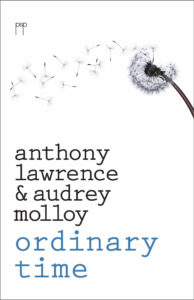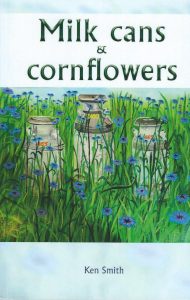 One poet has a ‘time travel machine’ which takes him/her through past and present the other poet writes ethereal intense beautiful words. As I read each poem my mind struggled trying to decide who is he and who is she. I read a few lines and decided, yes this was written by Lawrence, then I read a few more lines and I decided no it was written by Molloy. Finally, I gave up and decided that beautiful poetry does not need a ‘gender’.
One poet has a ‘time travel machine’ which takes him/her through past and present the other poet writes ethereal intense beautiful words. As I read each poem my mind struggled trying to decide who is he and who is she. I read a few lines and decided, yes this was written by Lawrence, then I read a few more lines and I decided no it was written by Molloy. Finally, I gave up and decided that beautiful poetry does not need a ‘gender’.
Category: Book Reviews
Book Reviews
A review of Fugitive by Simon Tedeschi
 Fugitive is a moving and thought-provoking book. It is pithy and at times, funny, full of minor transgressions, extensive scholarship, music and yes, poetry. There is so much compacted into each of these small pieces and yet Fugitives is airy, with enough space to encompass contradiction, breath and above all, silence, another recurring theme.
Fugitive is a moving and thought-provoking book. It is pithy and at times, funny, full of minor transgressions, extensive scholarship, music and yes, poetry. There is so much compacted into each of these small pieces and yet Fugitives is airy, with enough space to encompass contradiction, breath and above all, silence, another recurring theme.
A review of Milk cans & cornflowers by Ken Smith
 The poems in Ken Smith’s collection, Milk cans & cornflowers, show a love of language that rises above workmanlike prose. The author lets readers experience walks along the St. Lawrence River; shares some of his past, points out striking objects or phenomena, and acknowledges the importance of family, including the “family” of great poets and writers of the past.
The poems in Ken Smith’s collection, Milk cans & cornflowers, show a love of language that rises above workmanlike prose. The author lets readers experience walks along the St. Lawrence River; shares some of his past, points out striking objects or phenomena, and acknowledges the importance of family, including the “family” of great poets and writers of the past.
A review of Earlier by Sasha Frere-Jones
 I also really wished that that was going to create a clearing in the critical discourse in which I could discuss the Situationists, among other Francophile souvenirs I’ve collected over the years. Afterall, “Greil Marcus, Lipstick Traces” is the last bit of language on the back cover. Possibility of a backdoor?
I also really wished that that was going to create a clearing in the critical discourse in which I could discuss the Situationists, among other Francophile souvenirs I’ve collected over the years. Afterall, “Greil Marcus, Lipstick Traces” is the last bit of language on the back cover. Possibility of a backdoor?
A review of Strange Meadowlark by Michael Simms
 The music of the poems is suffused by a nuance of idiosyncrasies that leaves one having to learn how to read them, stopping and starting occasionally. But these reveal themselves as integral to the themes. For instance, there’s a conspicuous absence of periods.
The music of the poems is suffused by a nuance of idiosyncrasies that leaves one having to learn how to read them, stopping and starting occasionally. But these reveal themselves as integral to the themes. For instance, there’s a conspicuous absence of periods.
The Archaeology of Memoir: A review of It’s No Puzzle: A Memoir in Artifact by Cris Mazza
 It’s No Puzzle: A Memoir in Artifact was a challenge to write and assemble with its vast cache of memorabilia. The publisher, Spuyten Duyvil Press, did an exemplary job of logistically formatting the book to its polished result. What Mazza uncovers explains her challenges even if it doesn’t quite resolve them.
It’s No Puzzle: A Memoir in Artifact was a challenge to write and assemble with its vast cache of memorabilia. The publisher, Spuyten Duyvil Press, did an exemplary job of logistically formatting the book to its polished result. What Mazza uncovers explains her challenges even if it doesn’t quite resolve them.
A review of Edith Wharton’s The House of Mirth
 As a protagonist, Lily is not easy to love. She isn’t down to earth and feisty like a Jane Austen heroine or destitute and virtuous like one of Thomas Hardy’s. She is vain, materialistic, and small-minded. She obsesses over clothes, incomes, and table settings, and is cruel to the friends whose modest means render them socially useless to her.
As a protagonist, Lily is not easy to love. She isn’t down to earth and feisty like a Jane Austen heroine or destitute and virtuous like one of Thomas Hardy’s. She is vain, materialistic, and small-minded. She obsesses over clothes, incomes, and table settings, and is cruel to the friends whose modest means render them socially useless to her.
New giveaway!
 We have a copy of Tandem by Andy Mozina to give away!
We have a copy of Tandem by Andy Mozina to give away!
To win, sign up for our Free Newsletter on the right-hand side of the site and enter via the newsletter. Winner will be chosen by the end of December from subscribers who enter via the newsletter. Good luck!
A review of Transcript of the Disappearance, Exact and Diminishing by Lynn Emanuel
 In what may be in the voice of the Coronavirus talking to the poet, she writes in “Plague’s Monologue,”: “I erased the world so nothing can find it…” and concludes the piece, “…there is no limit to my appetite, my lust, my zeal for emptiness. But I know you—and you have kept a transcript of the disappearance.”
In what may be in the voice of the Coronavirus talking to the poet, she writes in “Plague’s Monologue,”: “I erased the world so nothing can find it…” and concludes the piece, “…there is no limit to my appetite, my lust, my zeal for emptiness. But I know you—and you have kept a transcript of the disappearance.”
A review of Bleedings by Gabriele Tinti
 Poetry is this ability to transcend, to cross through the masks that feed the comedy, living bulimically on illusions; it is looking beyond what appears, entering the shadow, listening to the unspeakable until the original silence while keeping the wound always open because we need to be there, close to the blade,/ at the mercy of pain, letting that blood, which is life, flow. Hence, bleeding as an opening, as the only possibility of existence.
Poetry is this ability to transcend, to cross through the masks that feed the comedy, living bulimically on illusions; it is looking beyond what appears, entering the shadow, listening to the unspeakable until the original silence while keeping the wound always open because we need to be there, close to the blade,/ at the mercy of pain, letting that blood, which is life, flow. Hence, bleeding as an opening, as the only possibility of existence.